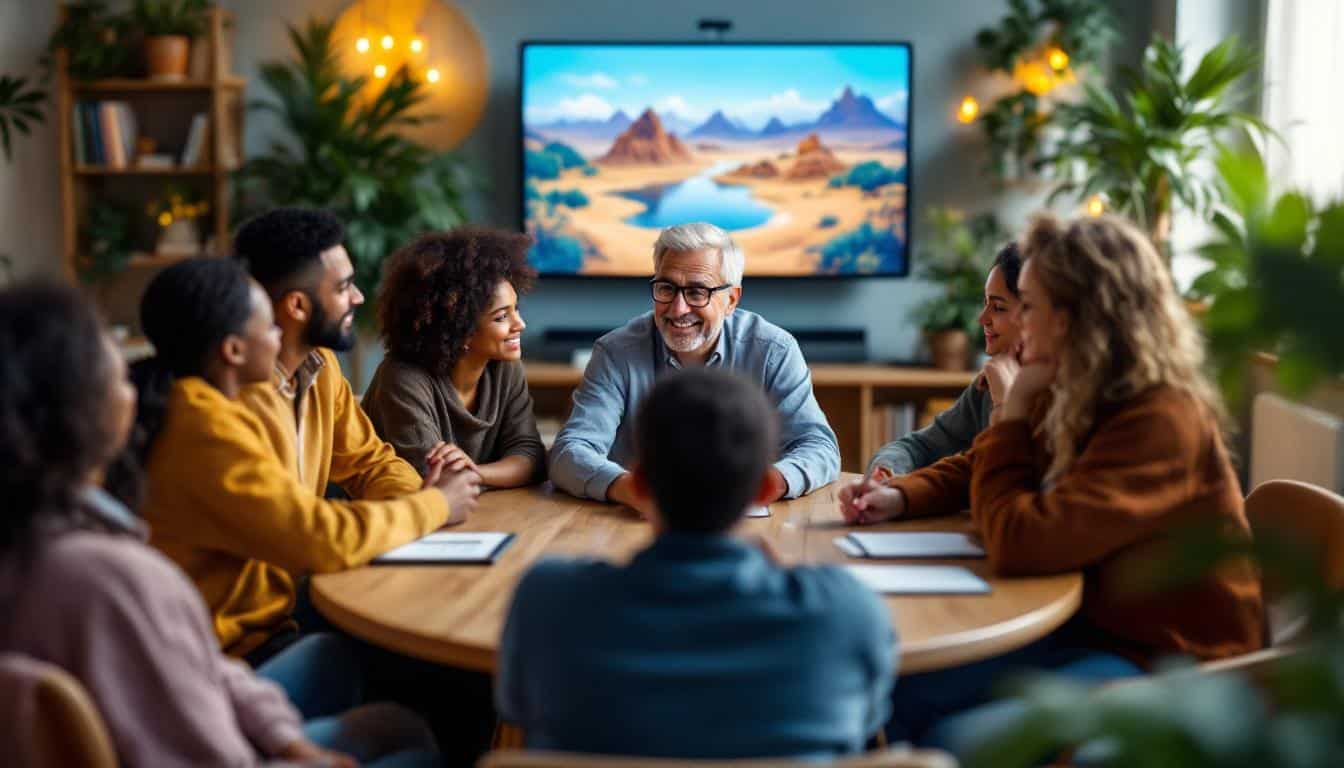“`html
Summer vacation is fast approaching, and for many, that means organizing a group trip. For introverts, this prospect can sometimes be a source of apprehension. How can one fully enjoy while respecting their need for solitude?
Planning a vacation with loved ones is a rewarding experience, but it requires some preparation, especially for those who prioritize alone time. It is not necessary to forgo shared pleasures or feel drained at the end of the trip. With a few strategies, it is possible to find a harmonious balance between socialization and personal recharge, thus ensuring a memorable and fulfilling summer.

Feeling stressed by group travel is a common experience, particularly for introverts. The idea of spending long periods away from home surrounded by many people can generate considerable anxiety. Introverts appreciate the company of their loved ones but are aware of their limits regarding socialization, which can lead them to feel exhausted during extended stays in a group.
A mental health expert, Catherine Lee, advises adopting strategies to better manage this stress. It is essential to recognize the signs of fatigue and irritability, indicating a need for personal recharge. Taking intentional moments of solitude, such as stepping away for a morning walk or enjoying a quiet moment by the pool with headphones, can help restore energy.
Communication also plays a key role. Clearly expressing to travel companions the importance of these moments of solitude helps to create realistic expectations and avoid misunderstandings. By planning ahead and setting boundaries, introverts can fully enjoy the benefits of group travel while preserving their mental well-being.

Group travels can be a source of joy and unforgettable memories. However, for introverts, the idea of spending prolonged time in the company of many others can lead to stress and anxiety. Understanding the unique challenges that introverts face during group travel is essential to creating enjoyable and balanced experiences. This article explores effective strategies shared by experts to help introverts manage their stress and fully enjoy their group vacations.
Understanding Introverts’ Needs
Introverts often find energy recharge in solitude or limited social interactions. During a group trip, it is crucial to recognize these specific needs. For instance, Catherine Lee, a mental health counselor, emphasizes the importance of recharging one’s social battery to avoid burnout. Introverts must identify their own limits and understand that taking time for oneself is not a sign of weakness but a necessity for maintaining their well-being. By recognizing these needs, group travels can become more enjoyable and less stressful. To deepen this understanding, you can consult the communication challenges for introverted types and how to overcome them.
Planning Alone Time During the Trip
Incorporating moments of solitude into the trip itinerary is a key strategy for introverts. Blocking specific time slots for relaxation or solo exploration helps maintain a balance between social activities and moments of rest. For example, choosing to visit a tourist spot in the morning and spending the afternoon reading or meditating can help recharge one’s energy. This proactive organization prevents overexertion and guarantees that each vacation day is enjoyable. Furthermore, planning these moments in advance facilitates communication with the group and reduces misunderstandings. Thus, everyone can fully enjoy the trip while respecting individual needs.
Communicating Limits to Travel Companions
Transparent communication with group members is essential to avoid stressful situations. Clearly explaining one’s needs for alone time allows others to better understand and respect those limits. For instance, announcing that one will take a moment of solitude after an activity can prevent feelings of guilt or rejection. Using phrases like “I need a few minutes to recharge” fosters an atmosphere of mutual respect. This proactive approach helps maintain harmonious relationships within the group while preserving one’s own well-being.
Choosing Suitable Activities
Selecting activities that match one’s preferences can greatly enhance the travel experience. Opting for calm excursions, such as nature walks or cultural visits, rather than overly lively events, allows for better energy management. Introverts can also suggest alternative activities that suit them better, ensuring a balanced participation. For example, during a beach trip, favoring moments of reading or relaxation by the water can be more calming than group parties. This customization of activities contributes to a more serene and enriching trip.
Managing Fatigue and Stress
Managing fatigue is crucial to avoid exhaustion during group travels. Recognizing signs of fatigue, such as irritability or the need to withdraw, allows for preventive measures. Simple techniques, such as regular breaks or moments of relaxation, can make a big difference. Additionally, adopting an adequate sleep routine and a balanced diet contributes to maintaining a good energy level. By integrating these practices, introverts can better manage their stress and fully enjoy every moment of the trip.
Using Relaxation Techniques
Relaxation techniques, such as meditation, deep breathing, or yoga, are effective tools for introverts wishing to reduce their stress during group travels. These practices allow for regaining a state of calm and refocusing thoughts, even amidst the hustle and bustle. For example, a few minutes of conscious breathing at the start of the day can help approach activities with serenity. Integrating these techniques into the daily travel routine facilitates emotional management and contributes to a more balanced and enjoyable experience.
Networking Strategies for Introverts
Networking can seem intimidating for introverts, but with the right strategies, it is possible to create authentic connections without feeling overwhelmed. For example, favoring small, deep conversations over superficial interactions helps to forge more meaningful bonds. Participating in group activities with a common goal also facilitates natural and less stressful exchanges. To learn more about these strategies, check out Networking Strategies for Introverts.
Adopting Suitable Negotiation Techniques
Group travels often require compromises and adjustments. Introverts can benefit from specific negotiation techniques to express their needs without conflict. For example, using assertive yet respectful approaches can help find mutually satisfactory solutions. Knowing how to say no politely and proposing alternatives can help maintain harmony within the group. To discover suitable methods, check out Negotiation Techniques Adapted to Your MBTI Profile.
Optimizing Communication During the Trip
Effective communication is essential to avoid misunderstandings and tensions within the group. Introverts can use adapted communication strategies to clearly express their needs and listen actively to those of others. For example, favoring quiet moments to discuss the day’s plans allows for better structuring of activities and respect for everyone’s needs. By adopting open and honest communication, all group members can feel valued and understood, thus fostering a positive and collaborative atmosphere. For more tips, explore Communication in Romantic Relationships Between Different MBTI Types.
Group travels can be both enriching and stressful for introverts. By understanding their needs, planning alone time, communicating their limits clearly, and choosing suitable activities, introverts can fully enjoy their vacations without sacrificing their well-being. Using relaxation techniques, adopting appropriate networking and negotiation strategies, and optimizing communication are key steps to transforming the group travel experience into a pleasant and balanced moment. By integrating these tips, introverts can successfully navigate group dynamics and create cherished memories while respecting their own needs.

“`html
FAQ
Q: How can introverts manage the stress of group travel?
A: Introverts can manage stress by planning moments of solitude to recharge, even during group trips. Identifying and respecting their sociability threshold is essential to avoid exhaustion.
Q: What are the signs that an introvert needs to recharge during a group trip?
A: Signs include fatigue, irritability, and the need to withdraw. Recognizing these signs allows for necessary breaks to recharge energy.
Q: What strategies can help introverts balance socialization and solitude during group vacations?
A: It is helpful to block out time slots for oneself, such as leaving a bit earlier in the evening or participating in certain activities alone. Clearly communicating one’s needs to other group members facilitates this balance.
Q: How can introverts communicate their need for alone time within a group?
A: By openly and honestly expressing the importance of recharge moments, introverts can establish mutual understanding. For example, explaining that these moments help them to be more present and engaged afterward.
Q: What to do when the fear of missing out (FOMO) affects an introvert during a group trip?
A: It is important to reevaluate whether it is really FOMO or a fear of disappointing the group. Adjusting one’s schedule to include personal time while participating in activities can help manage this feeling.
Q: What advice does an expert give introverts to fully enjoy group vacations without feeling exhausted?
A: The expert recommends practicing intentional self-care, setting clear boundaries, and communicating needs. This allows for enjoyment of group moments while preserving personal energy.











